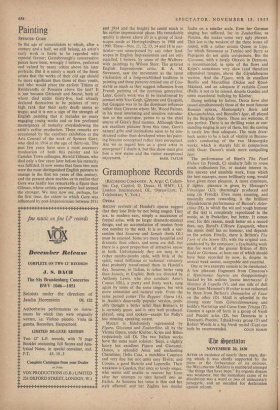Gramophone Records
(RECORDING COMPANIES: A, Argo; C, Colum- bia; 'Cap, Capitol; D, Decca; H, HMV; LI, London International; 01., Oi5eau-Lyre; T. Telefunken; V, Vox.)
OPERA
RECENT revivals •of Handel's operas suggest that they lose little by not being staged. They are, to modern ears, simply a succession of formal arias, with no larger dramatic-musical design, and no accumulation of tension from one number to the next. It is as such a suc- cession that Sosarme .and Semele (both OL) must be enjoyed. Some are more beautiful and dramatic than others, and some are dull, but there is a good proportion of attractive music in both. Unfornmately they are sung in a rather namby-pamby style, with little of the spirit, vocal brilliance or technical virtuosity that probably transformed them in Handel's day. Sosarme, in Italian, is rather better sung than Semele„ in English. Both are directed by Anthony Lewis, who also conducts Arne's Comus (OL), a pretty and lively work, sung again by some of the same singers, but with more animation and natural style. From the same period comes The Beggars' Opera (A), in Austin's deservedly popular version, prob- ably thought a better seller than Britten's. It is certainly gayer, and is very well produced. played, sung and spoken—except for Polly's too mincing speaking accent.
Mozart is handsomely represented by Figaro, Giovanni and Zauberflote, all by the Vienna Opera, under Kleiber, Krips and Bohm respectively (all ID). The two 'Italian works have the same main soloists : Siepi, a slightly heavy but excellent Figaro and Giovanni; Danco, a splendid Anna and enchanting Cherubino; Della Casa, a matchless Countess and very fine but not quite easy Elvira; and Corena, a good Bartolo and Leporello. Their weakness is Gueden, that once so lovely singer, who seems still unable to recover her form after her attempts to turn herself into an Italian. As Susanna her voice is thin and her style affected, and her Zeslina has similar faults on a smaller scale. Even her German singing has suffered, for in Zauberate, as Pamina, she makes some very ugly phrases. This last is the weakest of the three issues all round, with a rather erratic Queen in Lipp, for which Simoneau as Tamino and Berry as Papageno do not quite compensate. But the Giovanni, with a lovely Ottavio in Dermota, is recommended, in spite of the flaws and Krips's sometimes very slow (and therefore eipensive) tempos, above the Glyndebourne version. And the Figaro, with its excellent Basilio and Marcellina (Dickie and Rossi- Majdan), and an adequate if variable Count (Pcell), is not to be missed, despite Gueden and some occasional bullying by Kleiber.
Doing nothing by halves, Decc,a have also issued simultaneously three of the most famous Russian operas, Mussorgsky's Boris and Khovanshchina, and Borodin's Igor, all played by the Belgrade Opera. These are welcome, if less perfect. There is no thrilling voice or out- standing singing in any of them, but the casting is rarely less than adequate. The main draw- back seems to be a lack of vitality in Barano- vich's conducting of the two Mussorgsky works, which is sharply felt in comparison with Oscar Danon's much more compelling Igor.
The performance of Bizet's The Pearl Fishers (in French, C) similarly fails to rouse much enthusiasm for, or sustain interest in, this uneven and unsubtle work, from which the best excerpts, more brilliantly sung, would have given more pleasure. A more consistent, if lighter, pleasure is given, by Messager's Veronique (LI). charmingly produced and sung (in French). Even more amusing, and musically more rewarding, is the brilliant Glyndebourne performance of Busoni's Arlec- chino (H), in which the wit and rough humour of the text is completely reproduced in the music, as in Prokofiev, but better. It comes over, for this reason, much better on a record than, say, Ravel's L'Heure Espagnole, where the music itself has no humour, and depends on the action. Finally, there is Britten's The Turn of the Screw (D), with the original cast, conducted by the composer, a fascinating work that for want of the greater Britten of Billy Budd or Gloriana, at least one of which should have been recorded by now, is, despite its several weak scenes, acceptable and essential.
One or two excerpts remain to be mentioned. A few pleasant fragments from Cimarosa's II Mat rimonio Segreto are disappointingly backed by his tedious 'jocose intermezzo' II Maestro di Capella (V), and one side of dull songs from Massenet's Werther is not redeemed by three from Berlioz's Damnation of Faust on the other (D). WWI is splendid in the closing scene from Gotterammerung and Isolda's Narration and Curse from Tristan (T). Gueden is again off form in a group of Verdi and Puccini arias (D), but Dermota in a Donizetti, Puccini, Tchaikbvsky group (T) and Robert Weede in a big Verdi recital (Cap) can










































































 Previous page
Previous page